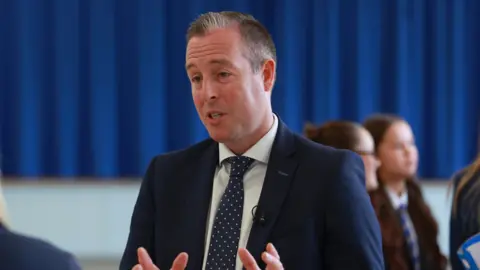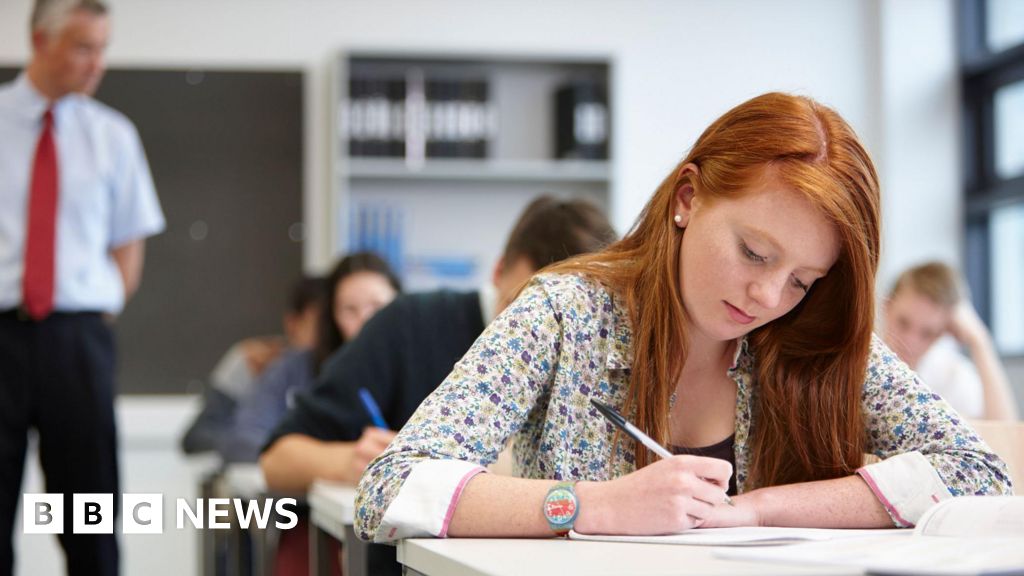 Getty Images
Getty ImagesEducation Minister Paul Givan has announced plans to make it compulsory for young people to stay in education or training until they are 18.
At present, young people in Northern Ireland can leave school at the age of 16. That has been the law since 1972 but Givan called it a “remnant of a manufacturing society”.
There are about 14,000 young people in Northern Ireland who are not in education, employment or training – about 7% of 16-24 year olds – at a cost to the public sector of an estimated £134m.
It is understood that young people could continue their education in school, a Further Education (FE) College or in an apprenticeship.
“Participation in education beyond the age of 16 directly impacts upon life chances of young people,” Givan told the Stormont Assembly.
“Regrettably a young person’s background remains a key factor in whether they progress to post-16 education.
“Compulsory education or training ending at 16 is a remnant of a manufacturing society with many unskilled jobs that no longer exist. Jobs today require high levels of skill and education.”
Givan said he intends to bring forward legislation, and asked other parties to work with him “to make it a reality”.
 PA Media
PA MediaRaising the age at which a young person can leave education was recommended in a major review of Northern Ireland’s education system.
It said that was not the same as raising the school leaving age, as young people could continue their education in school, a Further Education (FE) college or start an apprenticeship.
But it also said that “the interests of individuals nor society are well served by allowing young people to opt out of education” at the age of 16.
 Getty Images
Getty ImagesIn England, pupils have to study or train until they are 18, either going on to college or sixth form, an apprenticeship, or studying part-time while volunteering or working.
In Wales, a think-tank recently said young people should have to stay in education or training until they are 18.
In the Republic of Ireland and Scotland, the minimum school leaving age is 16.
In other European countries the school leaving age varies from 16 to 18.
The review also called for more effort to tackle the impact of poverty on educational achievement.
But a scheme recently announced by the Department of Education (DE) to do that has been accused of ‘punishing poverty.’
‘It just depends’

Fifteen-year-old Corey, who attends St Colm’s High School in Belfast, thinks it’s an “interesting” idea, but says it won’t suit everybody.
“I think it’s more circumstantial, like if you were going to stay until then, it just depends on the person’s family and what’s going on in their lives,” he said.
Corey said it depends on whether a pupil needs “to leave school and help their family, or if they want to go further on in their education, because some families can’t wait for their children to be 18 to provide”.
Funding

Clodagh,18, said she didn’t “really have any idea” of what she wanted to do when she was 16 and decided to stay on at school.
“I think it might be difficult because if they go on to do apprenticeships or anything then people might not know how to fund that for them”
Despite this, Clodagh thinks it’s a good idea and thinks there should “definitely” be something in place for young people.
‘Should be optional’

Ryan, 18, who also goes to St Colm’s, thinks it’s a “good” idea, but “you’ve to consider people with additional needs”.
“They might not be able to go into an apprenticeship. They might not want to stay on in school; they might want to come out because they feel uncomfortable in those type of situations,” Ryan pointed out.
“There should be something in place, but it should be optional,” he added.
Ryan said he knows “plenty of people” who “tried sixth form and didn’t like it and dropped out so they started working instead”.
‘Cohort’ of children ‘being failed’

Teacher Ursula Mackel thinks the minister’s idea is “good in theory” but “a lot of the detail needs to be looked into”.
“It is a really good idea because early school leaving is linked to social exclusion and poverty and unemployment, but I think the bigger question needs to be asked as to why children want to leave school at 16,” Ms Machel said.
“I feel very strongly that there are a big cohort of children who are being failed,” she added.
Academic qualifications aren’t “suitable for a lot of children and they’re failing and they become disaffected and they leave.”
“Then perhaps they go into an apprenticeship, which is wonderful and it’s what they want to do but the funding isn’t there for the long-time placement and those children end up leaving the apprenticeship”, she said.
Special Educational Needs
The minister also announced his stance on other recommendations in the independent review, including more funding for education, saying he is committed to “increased investment” particularly in areas of school improvement and Special Educational Needs (SEN).
One of the key recommendations is to reform SEN services, “so that learners with additional education needs receive tailored support at the earliest possible opportunity”, the minister said.
“The current system is not working for many children with Special Educational Needs: expenditure continues to grow but planning is poor, with a focus on process rather than children,” Givan said.

